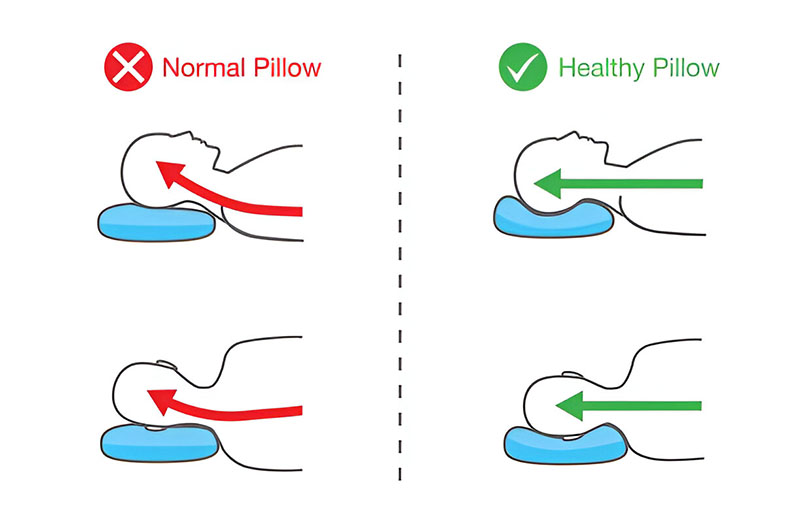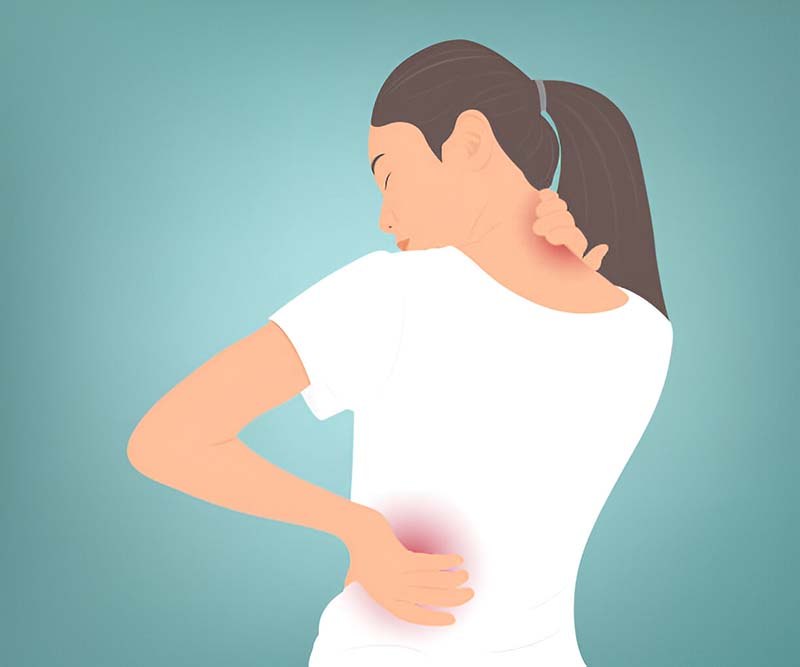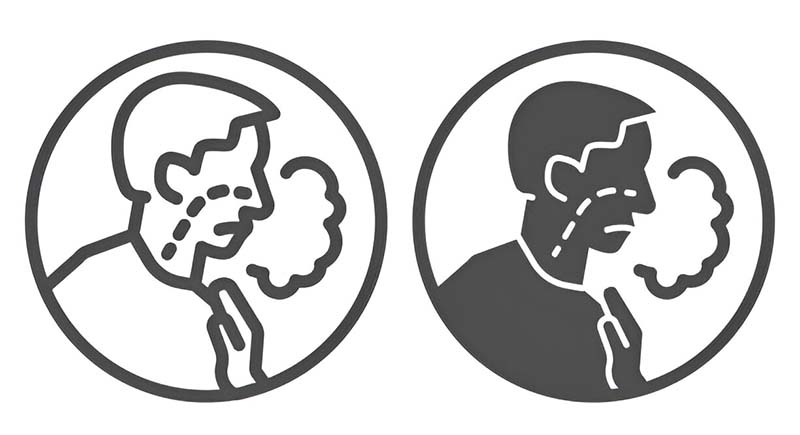Is your pillow hurting you or your sleep? Picking out random pillows might not be the bargain you thought it would be. If you have trouble shutting your eyes at night, your pillow and how you sleep on it might have something to do with it.
All the ways you twist and bend during your day leading up to bedtime affect your sleeping process, too. Choosing the right pillow, eliminating some everyday sleeping habits, and knowing how to sleep on your pillow and your mattress before you hit the hay can help you get your best night’s rest. Let’s discuss how using the wrong pillow might ruin your sleep and wake you up in pain.
How Does it Cause Neck Pain?

Many bad daily habits cause neck, back, and spine pain. Slouching while working, walking, or eating is one. Constantly looking down at your smartphone or computer can also cause neck aches.
If you wake up with a stiff and sore neck every morning, either the pillow you're using is wrong or the way you use it is terrible. Regular pillows might not provide the level of support you’d need. For example, side sleepers need a soft, medium-firm pillow with a high loft to support their neck and head.
Spending 7-9 hours in an unhealthy position might soon lead to chronic neck problems. Pillows, latex, feathers, buckwheat, and other viable options should be used to curb issues. Additionally, it would be very effective if you adopted proper sleeping positions.
If you are a back sleeper, place a pillow underneath your pelvis to align your spine correctly. Side Sleepers can put a pillow between their knees to maintain a comfortable balance between their head, neck, and spine.
| Type of Pillow | Material | Suitable for |
|---|---|---|
| Cotton Pillow | 100% cotton filling | Stomach sleepers |
| Latex Pillow | Natural or synthetic latex | All sleep positions |
| Polyester Pillow | Synthetic polyester filling | Back and side sleepers |
| Memory Foam Pillow | Polyurethane foam | Side and back sleepers |
| Buckwheat Pillow | Buckwheat hull filling | Side and back sleepers |
How Does it Cause Back Pain?
When you wake up in pain every morning, it ruins your entire day. Bad back pain will not let you do your basic chores—even raising your hand can be arduous! When you ignore your pillow and your sleeping position, it may end bizarrely.
A pillow that is too soft or thin might sink your head and neck too much into it, creating a lot of pressure in the lumbar region and resulting in back pain. On the other hand, pillows that are too thick will hold your head too high up, misaligning your neck with your back. The muscles in the lower back will try to overcompensate for any misalignment and take the hit.
Stomach and side sleepers tend to experience lower back pain when sleeping on a pillow that doesn’t cradle the head and neck in proper alignment. Back sleepers may experience lower back pain if their knees aren’t supported with additional support pillows.
What Causes Stiffness?
There are days when you can’t even move out of your bed. You feel stuck, dragged, and constantly tired. Every inch of your body feels the stiffness, no matter the affected area. Muscles, when stretched unnaturally for an extended period and contracted when released, cause your body to be stiff. The simple reason is the lack of proper support to the neck and head. The neck and back muscles stretch out of alignment at night rather than be held in a neutral position.
When you wake up, stretched neck muscles may contract and tighten, causing the neck and back to feel stiff and tense. Stiffness can range from mild—where it disappears after a few morning movements—to severe—where it continues well into the day, even with lots of movement. Everyday pillows will not give you the support you need to balance your body; they will disrupt your posture even more while sleeping.

How Does a Bad Pillow Cause Headaches?
There is nothing more annoying than a nagging headache in the morning. Nothing! You fail to carry on your day the way you want and do not wish to lift a finger after that. There is no one reason we can put a pin on for a headache. But mostly, headaches are a result of neck pain and muscle tension.
A group of muscles interact in the base of the neck, called suboccipital muscles, which directly links the nerve to the skull along with the center of the head and the eyes. Often, due to poor alignment, these muscles tense up and transfer pain to the head, resulting in severe headaches.
Pillows that are too high can cause the head and neck to round forward, adding tension to the suboccipital neck muscles. Too much tension in these muscles may result in headaches, either waking up with them or developing them once you’ve gotten out of bed.
How Can It Lead to Digestive and Breathing Problems?
Specific issues make having a good pillow of the utmost importance. Sleep Apnea is a sleeping condition in which you experience constant disruptions in breathing while sleeping. A wrong pillow on your bed aggravates this situation as it may not align your neck and head at a proper angle, which will block the airways between the throat and palate.
People with acid reflux might also be affected by the wrong pillow. Acid reflux weakens muscles between the throat and stomach, causing the acid to clump into the mouth and throat. This can lead to a painful sensation that won’t let you fall asleep. Pillows that are too thin don’t hold your head and neck high enough to prevent the acid backwash from reaching the chest and throat.

Pick the Pillow of Your Dreams
When hunting for the perfect pillow, consider your sleep type. Knowing your dominant sleep style (side, back, or stomach) will help you find the ideal pillow. How about sleepers who find themselves very hot at night? Your pillowcase should be made with breathable fabric—thick cotton or copper—to allow heat to flow from your head into the atmosphere.
Back sleepers should seek a thinner, flatter pillow to align the neck with the spine. We suggest that sleepers who experience neck pain opt for a more supportive pillow. Side sleepers, meanwhile, need a thicker, firmer pillow. The rule of thumb is to find a pillow as dense as the distance between your shoulder and ear. Stomach sleepers will benefit from a soft pillow...if they want a pillow under their head. The latter can place a soft pillow under their stomach and pelvis for proper alignment.
Final Thoughts
Whether you're a side, back, or stomach sleeper, selecting a pillow that supports your neck and keeps your spine aligned can significantly impact your sleep quality. The wrong pillow can lead to chronic problems like neck pain, back pain, stiffness, and headaches and may exacerbate conditions such as sleep apnea and acid reflux.
The pillow's material, thickness, and firmness are crucial based on your sleeping position and personal preferences. Investing in a pillow that suits your needs ensures you wake up refreshed and ready for the day, promoting overall well-being and quality sleep.
Sources:
Mirror: You've been using your pillow wrong - sleep expert urges people to make beneficial change
Mattress Clarity: 3 Ways Your Pillow Affects Your Health
Relax The Back: HOW TO CHOOSE A PILLOW FOR YOUR SLEEP NEEDS
Better Homes and Gardens: 3 signs that you’re sleeping on the wrong pillow






















